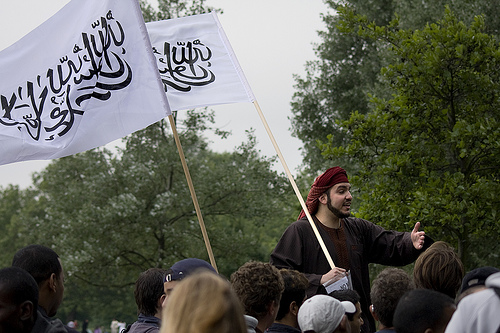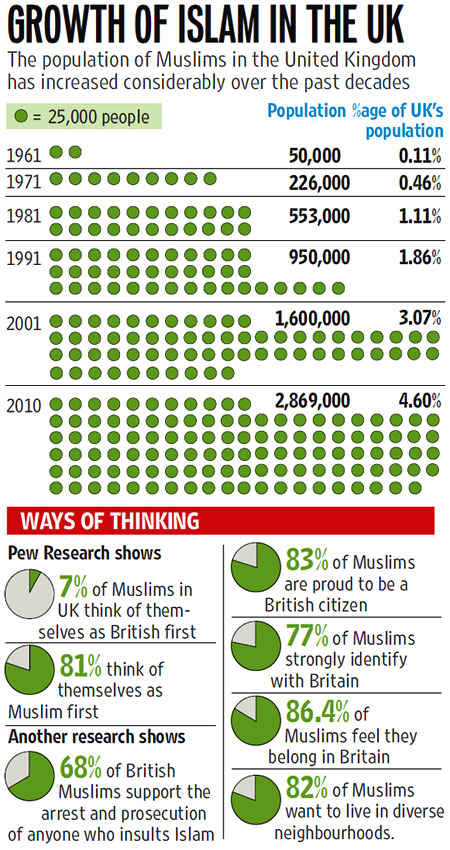

Leicester, the Muslim heart of Britain, could be West Asia. Veiled women and bearded men walk purposefully past Tudor-style shops in exposed brick. What does this tell you? That unlike in Continental Europe, the UK has not imposed unpopular checks on everyday Islamic symbols. At London’s Regent Park mosque on a Friday, Muslims of many ethnicities turn up, as the azaan fills the street near cricket’s mecca, the Lord’s. Not far, young white couples dig into succulent halal kebabs. Can multi-culture survive in England? British Muslims are struggling to remain who they are because of rising threats from intolerant far-right groups, such as the English Defence League and the British Nationalist Party.
The scene outside Regent’s Park is an example. Activists could be seen distributing leaflets urging British Muslims to stop the EDL from screening an anti-Islam video that had recently sparked a global backlash.
Muslims also recall that Prime Minister David Cameron had proposed hard-nosed “muscular liberalism”, asking Muslims to be British. “In our communities, groups and organisations led by young, dynamic leaders promote separatism by encouraging Muslims to define themselves solely in terms of their religion,” he had argued.
Although many Muslims are confused how exactly the new diversity model will work, Britain isn’t giving up on multi-culturalism. Not only is Britain unwilling to ban Muslim symbols, such as the veil, it also cracking down on those vilifying them.
Faith Matters, a publicly funded not-for-profit, is an instance of how Britain is trying to forge a national identity among Britain’s minorities without putting religious curbs.
In March, minister for equality Lynne Featherstone signed a plan to back a plan called “Measuring Anti-Muslim Attacks” (MAMA), a Faith Matters project to record and report anti-Muslim hate crime for legal action, one of the first such initiatives by a Western nation since 9/11.
“The fact is Islamophobia often goes unreported,” Fiyaz Moghul, the director of Faith Matters said.
Britain has pushed the envelope further. Long Live the Queen, but when Prince Charles assumes England’s next monarchy, British Muslims will curiously look for a change he has promised to his title as the new king.
Officially, England’s monarch is the “Defender of the Faith” or Christianity, a title conferred on Henry VIII by the Pope in 1521 for his backing of Roman Catholicism. Prince Charles plans to drop the definitive article “the” from his title as an endorsement of Britian’s multi-faith society.
On the ground, however, multi-faith is prone to tough tests. Baroness Sayeeda Warsi, the first British Muslim woman in the Cabinet, has publicly said that Islamophobia had “passed the dinner-table test” in English homes to become socially acceptable. (Glasgow’s central mosque has had its windows smashed. Burqa-clad women have been spat upon. Muslim taxi drivers have been assaulted during late night sorties, according to the European Monitoring Centre on Racism and Xenophobia.)
Some British Muslims find it difficult to reconcile Britain’s involvement in their native places, such as Iraq. Another problem is the general suspicion after the 7/7 attacks, when four young Muslim men, who apparently led ordinary lives, carried out the 2005 London bombings. “Muslims all of a sudden were being stereotyped,” Abdul Osman, Leicester’s lord mayor, said.
But sections of Britain society have acted decisively to flush out prejudice against Muslims, who make up 5% of the population. “We decided to treat attack on any one religious faith as an attack on all faiths,” said Andrew Wingate, priest and founding director of the St. Philip’s Centre, a clergy-led inter-faith institute.
Academia has often showed the way. Irene Zempi of the University of Leicester’s criminology department is studying experiences of veiled Muslim women who have faced hate crimes. “The idea is victim support,” she said.
Muslims aren’t giving up either. “There’s desperate need to help explain Islam,” says Faissal Hameed, the dean of Muslim College in Ealing. “We want to demonstrate that there’s no contradiction between being Muslim and being British.”




